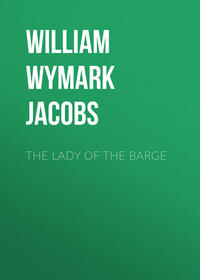 полная версия
полная версияAt Sunwich Port, Complete
The captain, confident in the security of these unwritten regulations, conversed freely with his peers. He had been moved to speech by the utter absence of discipline ashore, and from that had wandered to the growing evil of revolutionary ideas at sea. His remarks were much applauded, and two brother-captains listened with grave respect to a disquisition on the wrongs of shipmasters ensuing on the fancied rights of sailor men, the only discordant note being struck by the harbour-master, a man whose ideas had probably been insidiously sapped by a long residence ashore.
“A man before the mast,” said the latter, fortifying his moral courage with whisky, “is a human being.”
“Nobody denies it,” said Captain Nugent, looking round.
One captain agreed with him.
“Why don’t they act like it, then?” demanded the other.
Nugent and the first captain, struck by the remark, thought they had perhaps been too hasty in their admission, and waited for number two to continue. They eyed him with silent encouragement.
“Why don’t they act like it, then?” repeated number two, who, being a man of few ideas, was not disposed to waste them.
Captain Nugent and his friend turned to the harbour-master to see how he would meet this poser.
“They mostly do,” he replied, sturdily. “Treat a seaman well, and he’ll treat you well.”
This was rank heresy, and moreover seemed to imply something. Captain Nugent wondered dismally whether life ashore would infect him with the same opinions.
“What about that man of mine who threw a belaying-pin at me?”
The harbour-master quailed at the challenge. The obvious retort was offensive.
“I shall carry the mark with me to my grave,” added the captain, as a further inducement to him to reply.
“I hope that you’ll carry it a long time,” said the harbour-master, gracefully.
“Here, look here, Hall!” expostulated captain number two, starting up.
“It’s all right, Cooper,” said Nugent.
“It’s all right,” said captain number one, and in a rash moment undertook to explain. In five minutes he had clouded Captain Cooper’s intellect for the afternoon.
He was still busy with his self-imposed task when a diversion was created by the entrance of a new arrival. A short, stout man stood for a moment with the handle of the door in his hand, and then came in, carefully bearing before him a glass of gin and water. It was the first time that he had set foot there, and all understood that by this intrusion Mr. Daniel Kybird sought to place sea-captains and other dignitaries on a footing with the keepers of slop-shops and dealers in old clothes. In the midst of an impressive silence he set his glass upon the table and, taking a chair, drew a small clay pipe from his pocket.
Aghast at the intrusion, the quartette conferred with their eyes, a language which is perhaps only successful in love. Captain Cooper, who was usually moved to speech by externals, was the first to speak.
“You’ve got a sty coming on your eye, Hall,” he remarked.
“I daresay.”
“If anybody’s got a needle,” said the captain, who loved minor operations.
Nobody heeded him except the harbour-master, and he muttered something about beams and motes, which the captain failed to understand. The others were glaring darkly at Mr. Kybird, who had taken up a newspaper and was busy perusing it.
“Are you looking for anybody?” demanded Captain Nugent, at last.
“No,” said Mr. Kybird, looking at him over the top of his paper.
“What have you come here for, then?” inquired the captain.
“I come ‘ere to drink two o’ gin cold,” returned Mr. Kybird, with a dignity befitting the occupation.
“Well, suppose you drink it somewhere else,” suggested the captain.
Mr. Kybird had another supposition to offer. “Suppose I don’t?” he remarked. “I’m a respect-able British tradesman, and my money is as good as yours. I’ve as much right to be here as you ‘ave. I’ve never done anything I’m ashamed of!”
“And you never will,” said Captain Cooper’s friend, grimly, “not if you live to be a hundred.”
Mr. Kybird looked surprised at the tribute. “Thankee,” he said, gratefully.
“Well, we don’t want you here,” said Captain Nugent. “We prefer your room to your company.”
Mr. Kybird leaned back in his chair and twisted his blunt features into an expression of withering contempt. Then he took up a glass and drank, and discovered too late that in the excitement of the moment he had made free with the speaker’s whisky.
“Don’t apologize,” interrupted the captain; “it’s soon remedied.”
He took the glass up gingerly and flung it with a crash into the fireplace. Then he rang the bell.
“I’ve smashed a dirty glass,” he said, as the bar-man entered. “How much?”
The man told him, and the captain, after a few stern remarks about privacy and harpies, left the room with his friends, leaving the speechless Mr. Kybird gazing at the broken glass and returning evasive replies to the inquiries of the curious Charles.
He finished his gin and water slowly. For months he had been screwing up his courage to carry that room by assault, and this was the result. He had been insulted almost in the very face of Charles, a youth whose reputation as a gossip was second to none in Sunwich.
“Do you know what I should do if I was you?” said that worthy, as he entered the room again and swept up the broken glass.
“I do not,” said Mr. Kybird, with lofty indifference.
“I shouldn’t come ‘ere again, that’s what I should do,” said Charles, frankly. “Next time he’ll throw you in the fireplace.”
“Ho,” said the heated Mr. Kybird. “Ho, will he? I’d like to see ‘im. I’ll make ‘im sorry for this afore I’ve done with ‘im. I’ll learn ‘im to insult a respectable British tradesman. I’ll show him who’s who.”
“What’ll you do?” inquired the other.
“Never you mind,” said Mr. Kybird, who was not in a position to satisfy his curiosity—“never you mind. You go and get on with your work, Charles, and p’r’aps by the time your moustache ‘as grown big enough to be seen, you’ll ‘ear something.”
“I ‘eard something the other day,” said the bar-man, musingly; “about you it was, but I wouldn’t believe it.”
“Wot was it?” demanded the other.
“Nothing much,” replied Charles, standing with his hand on the door-knob, “but I wouldn’t believe it of you; I said I couldn’t.”
“Wot—was—it?” insisted Mr. Kybird.
“Why, they said you once gave a man a fair price for a pair of trousers,” said the barman, indignantly.
He closed the door behind him softly, and Mr. Kybird, after a brief pause, opened it again and, more softly still, quitted the precincts of The Goblets, and stepped across the road to his emporium.
Captain Nugent, in happy ignorance of the dark designs of the wardrobe dealer, had also gone home. He was only just beginning to realize the comparative unimportance of a retired shipmaster, and the knowledge was a source of considerable annoyance to him. No deferential mates listened respectfully to his instructions, no sturdy seaman ran to execute his commands or trembled mutinously at his wrath. The only person in the wide world who stood in awe of him was the general servant Bella, and she made no attempt to conceal her satisfaction at the attention excited by her shortcomings.
He paused a moment at the gate and then, walking slowly up to the door, gave it the knock of a master. A full minute passing, he knocked again, remembering with some misgivings his stern instructions of the day before that the door was to be attended by the servant and by nobody else. He had seen Miss Nugent sitting at the window as he passed it, but in the circumstances the fact gave him no comfort. A third knock was followed by a fourth, and then a distressed voice upstairs was heard calling wildly upon the name of Bella.
At the fifth knock the house shook, and a red-faced maid with her shoulders veiled in a large damp towel passed hastily down the staircase and, slipping the catch, passed more hastily still upstairs again, affording the indignant captain a glimpse of a short striped skirt as it turned the landing.
“Is there any management at all in this house?” he inquired, as he entered the room.
“Bella was dressing,” said Miss Nugent, calmly, “and you gave orders yesterday that nobody else was to open the door.”
“Nobody else when she’s available,” qualified her father, eyeing her sharply. “When I give orders I expect people to use their common sense. Why isn’t my tea ready? It’s five o’clock.”
“The clock’s twenty minutes fast,” said Kate. “Who’s been meddling with it?” demanded her father, verifying the fact by his watch.
Miss Nugent shook her head. “It’s gained that since you regulated it last night,” she said, with a smile.
The captain threw himself into an easy-chair, and with one eye on the clock, waited until, at five minutes to the hour by the right time, a clatter of crockery sounded from the kitchen, and Bella, still damp, came in with the tray. Her eye was also on the clock, and she smirked weakly in the captain’s direction as she saw that she was at least two minutes ahead of time. At a minute to the hour the teapot itself was on the tray, and the heavy breathing of the handmaiden in the kitchen was audible to all.
“Punctual to the minute, John,” said Mrs. Kingdom, as she took her seat at the tray. “It’s wonderful how that girl has improved since you’ve been at home. She isn’t like the same girl.”
She raised the teapot and, after pouring out a little of the contents, put it down again and gave it another two minutes. At the end of that time, the colour being of the same unsatisfactory paleness, she set the pot down and was about to raise the lid when an avalanche burst into the room and, emptying some tea into the pot from a canister-lid, beat a hasty retreat.
“Good tea and well-trained servants,” muttered the captain to his plate. “What more can a man want?”
Mrs. Kingdom coughed and passed his cup; Miss Nugent, who possessed a healthy appetite, serenely attacked her bread and butter; conversation languished.
“I suppose you’ve heard the news, John?” said his sister.
“I daresay I have,” was the reply.
“Strange he should come back after all these years,” said Mrs. Kingdom; “though, to be sure, I don’t know why he shouldn’t. It’s his native place, and his father lives here.”
“Who are you talking about?” inquired the captain.
“Why, James Hardy,” replied his sister. “I thought you said you had heard. He’s coming back to Sunwich and going into partnership with old Swann, the shipbroker. A very good thing for him, I should think.”
“I’m not interested in the doings of the Hardys,” said the captain, gruffly.
“I’m sure I’m not,” said his sister, defensively.
Captain Nugent proceeded with his meal in silence. His hatred of Hardy had not been lessened by the success which had attended that gentleman’s career, and was not likely to be improved by the well-being of Hardy junior. He passed his cup for some more tea, and, with a furtive glance at the photograph on the mantelpiece, wondered what had happened to his own son.
“I don’t suppose I should know him if I saw him,” continued Mrs. Kingdom, addressing a respectable old arm-chair; “London is sure to have changed him.”
“Is this water-cress?” inquired the captain, looking up from his plate.
“Yes. Why?” said Mrs. Kingdom.
“I only wanted information,” said her brother, as he deposited the salad in question in the slop-basin.
Mrs. Kingdom, with a resigned expression, tried to catch her niece’s eye and caught the captain’s instead. Miss Nugent happening to glance up saw her fascinated by the basilisk glare of the master of the house.
“Some more tea, please,” she said.
Her aunt took her cup, and in gratitude for the diversion picked out the largest lumps of sugar in the basin.
“London changes so many people,” mused the persevering lady, stirring her tea. “I’ve noticed it before. Why it is I can’t say, but the fact remains. It seems to improve them altogether. I dare say that young Hardy—”
“Will you understand that I won’t have the Hardys mentiond in my house?” said the captain, looking up. “I’m not interested in their business, and I will not have it discussed here.”
“As you please, John,” said his sister, drawing herself up. “It’s your house and you are master here. I’m sure I don’t want to discuss them. Nothing was farther from my thoughts. You understand what your father says, Kate?”
“Perfectly,” said Miss Nugent. “When the desire to talk about the Hardys becomes irresistible we must go for a walk.”
The captain turned in his chair and regarded his daughter steadily. She met his gaze with calm affection.
“I wish you were a boy,” he growled.
“You’re the only man in Sunwich who wishes that,” said Miss Nugent, complacently, “and I don’t believe you mean it. If you’ll come a little closer I’ll put my head on your shoulder and convert you.”
“Kate!” said Mrs. Kingdom, reprovingly.
“And, talking about heads,” said Miss Nugent, briskly, “reminds me that I want a new hat. You needn’t look like that; good-looking daughters always come expensive.”
She moved her chair a couple of inches in his direction and smiled alluringly. The captain shifted uneasily; prudence counselled flight, but dignity forbade it. He stared hard at Mrs. Kingdom, and a smile of rare appreciation on that lady’s face endeavoured to fade slowly and naturally into another expression. The chair came nearer.
“Don’t be foolish,” said the captain, gruffly.
The chair came still nearer until at last it touched his, and then Miss Nugent, with a sigh of exaggerated content, allowed her head to sink gracefully on his shoulder.
“Most comfortable shoulder in Sunwich,” she murmured; “come and try the other, aunt, and perhaps you’ll get a new bonnet.”
Mrs. Kingdom hastened to reassure her brother. She would almost as soon have thought of putting her head on the block. At the same time it was quite evident that she was taking a mild joy in his discomfiture and eagerly awaiting further developments.
“When you are tired of this childish behaviour, miss,” said the captain, stiffly–
There was a pause. “Kate!” said Mrs. Kingdom, in tones of mild reproof, “how can you?”
“Very good,” said the captain, we’ll see who gets tired of it first. “I’m in no hurry.”
A delicate but unmistakable snore rose from his shoulder in reply.
CHAPTER VI
For the first few days after his return Sunwich was full of surprises to Jem Hardy. The town itself had changed but little, and the older inhabitants were for the most part easily recognisable, but time had wrought wonders among the younger members of the population: small boys had attained to whiskered manhood, and small girls passing into well-grown young women had in some cases even changed their names.
The most astounding and gratifying instance of the wonders effected by time was that of Miss Nugent. He saw her first at the window, and with a ready recognition of the enchantment lent by distance took the first possible opportunity of a closer observation. He then realized the enchantment afforded by proximity. The second opportunity led him impetuously into a draper’s shop, where a magnificent shop-walker, after first ceremoniously handing him a high cane chair, passed on his order for pins in a deep and thrilling baritone, and retired in good order.
By the end of a week his observations were completed, and Kate Nugent, securely enthroned in his mind as the incarnation of feminine grace and beauty, left but little room for other matters. On his second Sunday at home, to his father’s great surprise, he attended church, and after contemplating Miss Nugent’s back hair for an hour and a half came home and spoke eloquently and nobly on “burying hatchets,” “healing old sores,” “letting bygones be bygones,” and kindred topics.
“I never take much notice of sermons myself,” said the captain, misunderstanding.
“Sermon?” said his son. “I wasn’t thinking of the sermon, but I saw Captain Nugent there, and I remembered the stupid quarrel between you. It’s absurd that it should go on indefinitely.”
“Why, what does it matter?” inquired the other, staring. “Why shouldn’t it? Perhaps it’s the music that’s affected you; some of those old hymns—”
“It wasn’t the sermon and it wasn’t the hymns,” said his son, disdainfully; “it’s just common sense. It seems to me that the enmity between you has lasted long enough.”
“I don’t see that it matters,” said the captain; “it doesn’t hurt me. Nugent goes his way and I go mine, but if I ever get a chance at the old man, he’d better look out. He wants a little of the starch taken out of him.”
“Mere mannerism,” said his son.
“He’s as proud as Lucifer, and his girl takes after him,” said the innocent captain. “By the way, she’s grown up a very good-looking girl. You take a look at her the next time you see her.”
His son stared at him.
“She’ll get married soon, I should think,” continued the other. “Young Murchison, the new doctor here, seems to be the favourite. Nugent is backing him, so they say; I wish him joy of his father-in-law.”
Jem Hardy took his pipe into the garden, and, pacing slowly up and down the narrow paths, determined, at any costs, to save Dr. Murchison from such a father-in-law and Kate Nugent from any husband except of his choosing. He took a seat under an old apple tree, and, musing in the twilight, tried in vain to think of ways and means of making her acquaintance.
Meantime they passed each other as strangers, and the difficulty of approaching her only made the task more alluring. In the second week he reckoned up that he had seen her nine times. It was a satisfactory total, but at the same time he could not shut his eyes to the fact that five times out of that number he had seen Dr. Murchison as well, and neither of them appeared to have seen him.
He sat thinking it over in the office one hot afternoon. Mr. Adolphus Swann, his partner, had just returned from lunch, and for about the fifth time that day was arranging his white hair and short, neatly pointed beard in a small looking-glass. Over the top of it he glanced at Hardy, who, leaning back in his chair, bit his pen and stared hard at a paper before him.
“Is that the manifest of the North Star?” he inquired.
“No,” was the reply.
Mr. Swann put his looking-glass away and watched the other as he crossed over to the window and gazed through the small, dirty panes at the bustling life of the harbour below. For a short time Hardy stood gazing in silence, and then, suddenly crossing the room, took his hat from a peg and went out.
“Restless,” said the senior partner, wiping his folders with great care and putting them on. “Wonder where he’s put that manifest.”
He went over to the other’s desk and opened a drawer to search for it. Just inside was a sheet of foolscap, and Mr. Swann with growing astonishment slowly mastered the contents.
“See her as often as possible.”
“Get to know some of her friends.”
“Try and get hold of the old lady.”
“Find out her tastes and ideas.”
“Show my hand before Murchison has it all his own way.”
“It seems to me,” said the bewildered shipbroker, carefully replacing the paper, “that my young friend is looking out for another partner. He hasn’t lost much time.”
He went back to his seat and resumed his work. It occurred to him that he ought to let his partner know what he had seen, and when Hardy returned he had barely seated himself before Mr. Swann with a mysterious smile crossed over to him, bearing a sheet of foolscap.
“Try and dress as well as my partner,” read the astonished Hardy. “What’s the matter with my clothes? What do you mean?”
Mr. Swann, in place of answering, returned to his desk and, taking up another sheet of foolscap, began to write again, holding up his hand for silence as Hardy repeated his question. When he had finished his task he brought it over and placed it in the other’s hand.
“Take her little brother out for walks.”
Hardy crumpled the paper up and flung it aside. Then, with his face crimson, he stared wrathfully at the benevolent Swann.
“It’s the safest card in the pack,” said the latter. “You please everybody; especially the little brother. You should always hold his hand—it looks well for one thing, and if you shut your eyes—”
“I don’t want any of your nonsense,” said the maddened Jem. “What do you mean by reading my private papers?”
“I came over to look for the manifest,” said Mr. Swann, “and I read it before I could make out what it was. You must admit it’s a bit cryptic. I thought it was a new game at first. Getting hold of the old lady sounds like a sort of blind-man’s buff. But why not get hold of the young one? Why waste time over—”
“Go to the devil,” said the junior partner.
“Any more suggestions I can give you, you are heartily welcome to,” said Mr. Swann, going back to his seat. “All my vast experience is at your service, and the best and sweetest and prettiest girls in Sunwich regard me as a sort of second father.”
“What’s a second father?” inquired Jim, looking up—“a grandfather?”
“Go your own way,” said the other; “I wash my hands of you. You’re not in earnest, or you’d clutch at any straw. But let me give you one word of advice. Be careful how you get hold of the old lady; let her understand from the commencement that it isn’t her.”
Mr. Hardy went on with his work. There was a pile of it in front of him and an accumulation in his drawers. For some time he wrote assiduously, but work was dry after the subject they had been discussing. He looked over at his partner and, seeing that that gentleman was gravely busy, reopened the matter with a jeer.
“Old maids always know most about rearing children,” he remarked; “so I suppose old bachelors, looking down on life from the top shelf, think they know most about marriage.”
“I wash my hands of you,” repeated the senior, placidly. “I am not to be taunted into rendering first aid to the wounded.”
The conscience-stricken junior lost his presence of mind. “Who’s trying to taunt you?” he demanded, hotly. “Why, you’d do more harm than good.”
“Put a bandage round the head instead of the heart, I expect,” assented the chuckling Swann. “Top shelf, I think you said; well, I climbed there for safety.”
“You must have been much run after,” said his partner.
“I was,” said the other. “I suppose that’s why it is I am always so interested in these affairs. I have helped to marry so many people in this place, that I’m almost afraid to stir out after dark.”
Hardy’s reply was interrupted by the entrance of Mr. Edward Silk, a young man of forlorn aspect, who combined in his person the offices of messenger, cleaner, and office-boy to the firm. He brought in some letters, and placing them on Mr. Swann’s desk retired.
“There’s another,” said the latter, as the door closed. “His complaint is Amelia Kybird, and he’s got it badly. She’s big enough to eat him, but I believe that they are engaged. Perseverance has done it in his case. He used to go about like a blighted flower—”
“I am rather busy,” his partner reminded him.
Mr. Swann sighed and resumed his own labours. For some time both men wrote in silence. Then the elder suddenly put his pen down and hit his desk a noisy thump with his fist.
“I’ve got it,” he said, briskly; “apologize humbly for all your candour, and I will give you a piece of information which shall brighten your dull eyes, raise the corners of your drooping mouth, and renew once more the pink and cream in your youthful cheeks.”
“Look here—” said the overwrought Hardy.
“Samson Wilks,” interrupted Mr. Swann, “number three, Fullalove Alley, at home Fridays, seven to nine, to the daughter of his late skipper, who always visits him on that day. Don’t thank me, Hardy, in case you break down. She’s a very nice girl, and if she had been born twenty years earlier, or I had been born twenty years later, or you hadn’t been born at all, there’s no saying what might not have happened.”
“When I want you to interfere in my business,” said Hardy, working sedulously, “I’ll let you know.”
“Very good,” replied Swann; “still, remember Thursdays, seven to nine.”
“Thursdays,” said Hardy, incautiously; “why, you said Fridays just now.”
Mr. Swann made no reply. His nose was immersed in the folds of a large handkerchief, and his eyes watered profusely behind his glasses. It was some minutes before he had regained his normal composure, and even then the sensitive nerves of his partner were offended by an occasional belated chuckle.









